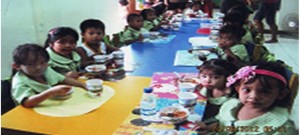
Five year-old Ian Pal is a picture of a healthy, happy child.
He was playful all the time that he and his grandfather, Pedro Pal, Jr., were waiting for their turn to speak before officials and staff of the Department of Social Welfare and Development (DSWD) during their flag ceremony on Moday at the Central Office in Batasan, Quezon City.
Pedro was to share how Ian become the active child that he is today through the help of the Department’s Sustainable Feeding Program (SFP).
SFP is the provision of food in addition to the regular meals to currently enrolled day care children as part of the DSWD’s contribution to the Early Childhood Care and Development (ECCD) Program of the government.
But Ian was not always attentive and healthy, narrated his grandfather. He was frail and sickly until his enrolment at the Luzviminda Yakap Center in Batasan Hills, Quezon City.
Before he was enrolled at the day care center in June, Ian only weighed 13 kilos. After three months as a beneficiary of the feeding program, his nutritional status visibly improved, his weight steadily increasing from 13 to 15 kilos.
The feeding program at the center continues enabling Ian to further gain weight and improve his nutritional status.
Asked what his favorite food are, the little boy promptly answered, “Gulay po kagaya ng kalabasa (I like vegetables, like squash),” Ian said.
Strong LGU support
Luisa Figues from the Quezon City Social Services Development Department (QC-SSDD) cited the support being provided by the local government unit (LGU) as instrumental to the program’s success.
Figues said that the Quezon City LGU has value added to the feeding program by providing free uniform, school bags, and schools supplies to the day care pupils.
“Malaking tulong talaga ito sa amin dahil karamihan sa mga pumapasok sa day care center ay mahihirap na bata (This is really a big help to us since majority of those enrolled at day care centers are poor children),” Figues explained.
The LGU also conducts Parent Effectiveness Service (PES) sessions to help parents become more aware of their critical roles in their children’s development.
On the other hand, seminars on urban gardening are also conducted to serve the nutritional needs of the children, ensuring a steady food supply, specifically fruits and vegetables.
“Kung makapagtatanim sila ng mga prutas at gulay sa kanilang bakuran, malaking tulong na ito upang magkaroon sila ng mapagkukunan ng pagkain para sa kanilang pamilya. Maari rin nilang ibenta ang kanilang maaani na dagdag kita para sa kanila (If they can plant fruits and vegetables in their backyard, this is already a big help to provide food for their families. They can also sell their harvests, which will serve as their additional income),“Figues stated.
Nationwide implementation
To fully implement the SFP, DSWD downloads the funds to each recipient LGU, which shall procure the needed goods with proper supporting documents as required under the existing budgeting, accounting and auditing rules and regulations.
The LGUs shall take full responsibility in the proper disbursement and liquidation of funds for the program’s implementation.
The program intends to cover more than two million beneficiaries for school year 2014-2015.
In the National Capital Region alone, about 161,528 day care children are currently benefiting from the program.
Convergence to fight hunger
Amid efforts to address hunger and poverty, DSWD partnered with the Department of Agrarian Reform (DAR) and Department of Agriculture (DA) with technical support from Food Agricultural Organization (FAO) and World Food Programme to engage poor households and work closely with the rural communities through the Partnership Against Hunger and Poverty (PAHP) project.
Under this initiative, the required food items that will be programmed for procurement during the 120 days feeding program will be supplied by existing Agrarian Reform Beneficiaries’ Organizations (ARBO) in the agrarian reform communities (ARC) engaged in food production for their respective day care centers.
This scheme will benefit both the local farmers and the beneficiaries of the feeding program. The PHAP is being piloted in Regions V, VIII, and IX.
“With this program, we are helping solve hunger among young children. This is also part of government’s efforts to change the attitude and behaviour of its beneficiaries instilling in them the willingness to change for the better,” Sec. Soliman emphasized. ###


